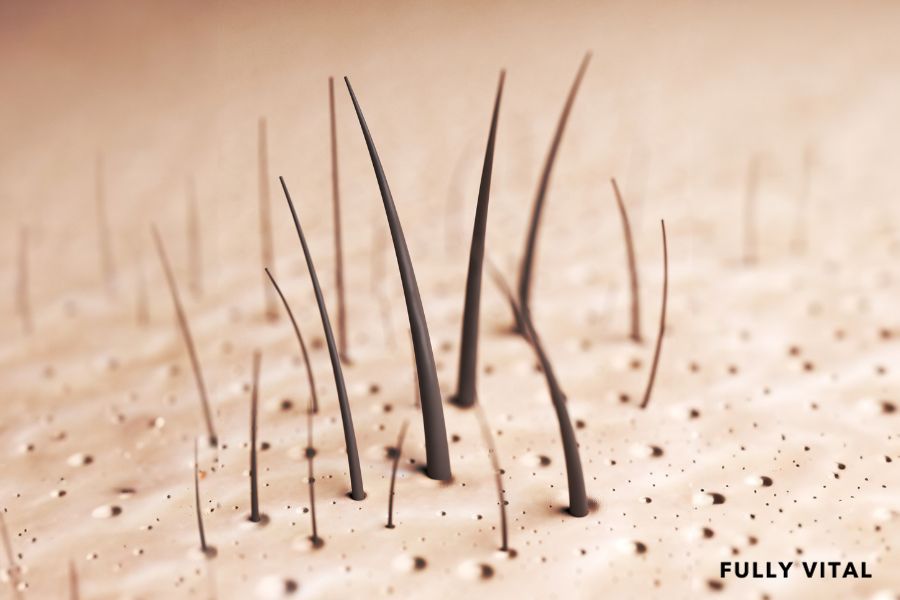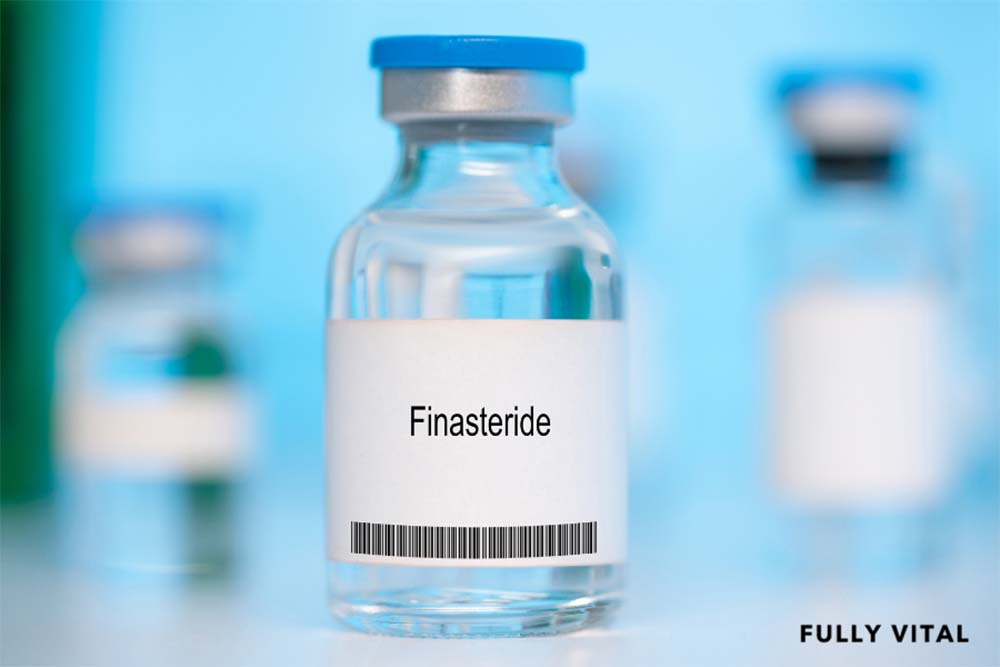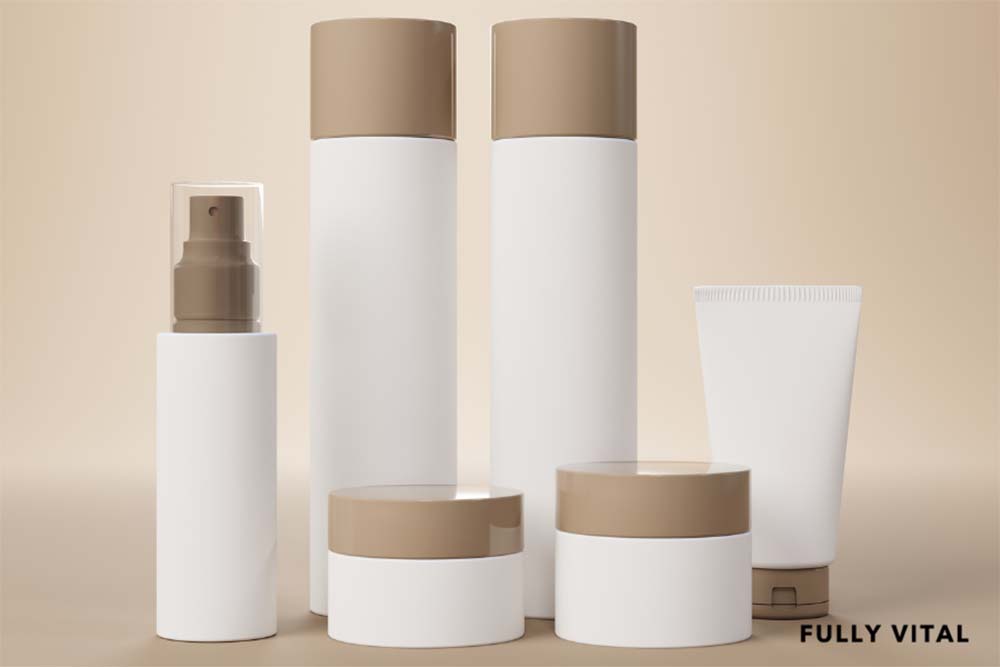
Can You Really Regrow Hair? Exploring The Possibilities
Are you tired of dealing with hair loss and thinning hair?
Do you long for a full and healthy head of hair?
You're not alone.
Many women, regardless of their hair type, are seeking effective ways to regrow their hair and stimulate hair growth.
In this article, we will get into the possibilities of regrowing hair and provide answers to the most commonly searched questions surrounding this topic.

I LOVE MY HAIR NOW
FullyVital hair serum and hair vitamins made tremendous improvements in my hair. I truly love my hair now.
Dorit S.,
Understanding Hair Regrowth
Hair regrowth refers to the process of new hair follicles forming and producing new hair strands after experiencing hair loss or thinning.
It involves the rejuvenation of dormant hair follicles or the stimulation of miniaturized follicles to grow thicker and healthier hair.
Hair regrowth can vary in speed and effectiveness depending on various factors, including genetics, lifestyle, and the chosen regrown hair methods or products.1
The Significance Of Hair Regrowth
Hair regrowth holds significant importance for individuals experiencing hair loss or thinning.
A full and healthy head of hair not only enhances one's physical appearance but also contributes to overall confidence and self-esteem.
Hair regrowth allows individuals to regain their desired hair density, restore volume, and feel more comfortable and confident in their own skin.2
The Process Of Hair Regrowth
The process of hair regrowth involves several stages:
Anagen Phase
This is the active growth phase of the hair follicles, during which the hair strands develop and lengthen.
This phase can last for several years.3
Catagen Phase
Also known as the transitional phase, this short phase signals the end of the active growth phase.
The hair follicle shrinks and detaches from the blood supply, preparing for new hair growth.4
Telogen Phase
The resting phase where the hair follicle is inactive and the hair strand is shed. This phase typically lasts for a few months.5
Exogen Phase
The shedding phase, during which the old hair strand is fully detached and falls out, making way for new hair growth.6

The Effectiveness Of Regrow Hair Products
Regrow hair products have gained popularity in recent years, promising to stimulate hair growth and combat hair loss.
While not all products may deliver the desired results, some hair growth solutions have shown effectiveness in clinical trials and customer reviews.
It's important to do thorough research before investing in any regrow hair product.
Look for products that contain scientifically proven ingredients, such as minoxidil or natural plant extracts, that have been shown to promote hair growth.7
The Role Of Diet And Nutrition In Hair Regrowth
Believe it or not, your dietary choices wield a profound impact on the health and regrowth of your hair.
To achieve the vibrant, lustrous locks you desire, maintaining a well-balanced diet rich in essential nutrients is absolutely key.
Essential vitamins, minerals, and proteins are the building blocks for robust hair follicles and promote regrowth.
Incorporating nutrient-rich foods like eggs, nuts, fish, leafy greens, and fruits into your daily meals provides the necessary nourishment for optimal hair growth.8
But the journey doesn't stop there.
The magic of hair regrowth can be further amplified with specialized supplements tailored to hair health.
In this section, we uncover the hidden secrets within your daily meals that contribute to your path to lustrous locks.
Nutrient Essentials
Adequate intake of essential nutrients like vitamins, minerals, and proteins is crucial for hair regrowth.
Protein Power
Protein-rich foods help in the formation of hair cells and promote healthy growth.
Vitamin Vitality
Vitamins like Biotin, Vitamin D, and Vitamin E play a key role in hair strength and regrowth.
Mineral Support
Minerals such as Iron and Zinc are essential for maintaining healthy hair.
Hydration Matters
Staying well-hydrated is important for hair health as well.
Balanced Diet
A well-rounded diet that includes a variety of nutrients is the foundation of robust hair regrowth.
Adequate Caloric Intake
Maintaining a healthy caloric intake is important to prevent hair loss due to nutritional deficiencies.
Omega-3 Fatty Acids
Foods rich in Omega-3 fatty acids, like fish and flaxseeds, can support healthy hair growth.

The Role Of Genetics In Hair Regrowth
Genetics can play a significant role in hair loss and regrowth.
If hair loss runs in your family, you may be genetically predisposed to experience thinning hair or baldness.
However, certain genetic factors can also affect the effectiveness of regrow hair products.
While genetics cannot be changed, there are still options available to stimulate hair regrowth and improve the overall appearance of your hair.9
Understanding How Stress Affects Hair Regrowth
Stress can take a toll on our overall health, including the health of our hair.
Whether it's due to work pressure, personal problems, or other factors, high levels of stress can contribute to hair loss and hinder the regrowth process.
Studies have shown that stress disrupts the natural hair growth cycle, leading to increased shedding and slower regrowth.
To promote hair regrowth, it is crucial to manage stress through relaxation techniques, exercise, and self-care.10
The Role Of Medications In Hair Regrowth
Certain medications can have an impact on hair regrowth.
For example, medications prescribed for various health conditions, such as hormonal imbalances or autoimmune disorders, may help stimulate hair regrowth as a side effect.
It's essential to consult with a healthcare professional to determine whether any medications you take could potentially aid in hair regrowth or if alternative treatments are available.11
Regrowing hair is a journey that involves understanding the factors that influence hair growth and exploring the possibilities available.
By managing stress, maintaining a healthy diet, considering genetic factors, researching effective regrow hair products, and exploring medications that may aid in regrowth, you can take proactive steps towards achieving healthier and fuller hair.
What Are The Advantages Of Hair Regrowth?
Hair regrowth offers several advantages for individuals seeking to combat hair loss and achieve a fuller head of hair:
- Enhanced self-confidence and improved self-esteem
- Restoration of a more youthful and vibrant appearance
- Increased styling versatility and the ability to experiment with different hairstyles
- Improved protection for the scalp against harmful UV rays, temperature changes, and other environmental factors
- Potential reduction in hair-related insecurities and social anxiety
What Are The Other Options For Hair Regrowth?
Aside from regrow hair products, there are other options individuals can explore to stimulate hair regrowth:
Hair Transplant Surgery
This procedure involves the transplantation of healthy hair follicles from one area of the scalp to areas experiencing hair loss.
It can provide long-lasting and natural-looking results.
Low-Level Laser Therapy (LLLT)
LLLT utilizes red light therapy to stimulate hair follicles, promoting hair regrowth.
This non-invasive treatment can be done at home using specialized devices.
Scalp Micropigmentation
This technique involves depositing pigments on the scalp to create the illusion of a fuller head of hair.
It can be a suitable option for individuals who prefer a non-surgical approach.
Platelet-Rich Plasma (PRP) Therapy
PRP therapy involves injecting a concentrated solution of the patient's own platelets into the scalp to stimulate hair growth.
It has shown promise in promoting hair regrowth in certain cases.
Revive Your Hair With Fully Vital!
Rediscover hair confidence, manageability, and timeless beauty with Fully Vital. |
Final Thoughts On Hair Regrowth
Understanding the possibilities and factors surrounding regrowing hair is essential for individuals seeking to combat hair loss and achieve a fuller, healthier head of hair.
By managing stress, adopting a balanced diet, considering genetic factors, exploring effective regrow hair products, and examining alternative treatments, individuals can take proactive steps towards achieving optimal hair regrowth.
However, it's important to note that regrowing hair is a journey that requires patience, consistency, and proper care.
While there are no guarantees, the advancements in a variety of hair growth products and treatments offer promising options for those struggling with hair loss or thinning.
As you begin on your hair regrowth journey, remember that everyone's hair is unique, and results may vary.
It's crucial to explore the options that align with your individual needs and goals.
Consulting with a healthcare professional or hair specialist will help you make informed decisions and choose the most appropriate path.
At Fully Vital, we understand the importance of regrowing hair and the desire for a healthy relationship with your locks.
Our range of hair growth products is designed to combat hair aging and promote vibrant, luscious hair.
Take the first step towards regaining your confidence and vitality—explore our products to discover the solution that best suits your hair needs.
It's time to embrace a fuller, healthier head of hair and enjoy the benefits that come with it.
Frequently Asked Questions On Hair Regrowth
What is the success rate of hair regrowth treatments?
The success rate of hair regrowth treatments depends on various factors, including the underlying cause of the hair loss, individual genetics, and the chosen treatment method.
Some treatments, such as FDA-approved hair growth medications like minoxidil or finasteride, have shown effectiveness in promoting hair regrowth for many individuals.
However, it's important to note that results can vary, and it may require consistent and long-term use of the treatment to maintain the desired results.
Can hair regrow after chemotherapy?
Yes, hair can regrow after undergoing chemotherapy.
However, the regrowth process varies for each individual.
Hair typically begins to grow back within weeks to months after completing chemotherapy treatment.
It may initially grow back with a different texture or color, but it often gradually returns to its pre-treatment state over time.
Do hair transplants regrow natural hair?
Hair transplants can effectively regrow natural hair.
During the procedure, healthy hair follicles are usually taken from a donor area, typically the back of the scalp, and transplanted to areas experiencing hair loss or balding.
These transplanted hair follicles continue to grow and produce hair just like the natural hair strands, resulting in regrowth that looks and feels natural.
Can hair regrow in bald spots?
With the right treatment and approach, hair can regrow in bald spots.
The effectiveness of regrowth varies depending on factors such as the cause of the bald spots, the health of the hair follicles in the area, and individual genetics.
Treatments such as minoxidil, low-level laser therapy, or hair transplant surgery may help stimulate regrowth in bald spots, but it's important to consult with a professional to determine the most suitable approach for your specific situation.
Do lifestyle factors affect hair regrowth?
Yes, lifestyle factors can impact hair regrowth.
Certain habits or choices, such as a poor diet, high levels of stress, smoking, and excessive heat styling or chemical treatments, can contribute to hair loss and hinder regrowth efforts.
Adopting a healthy lifestyle that includes a balanced diet, regular exercise, stress management, and gentle hair care practices can positively influence the regrowth process.
What vitamins promote hair growth?
Several vitamins are known to promote hair growth and overall hair health.
These include:
- Biotin (vitamin B7): Supports the production of keratin, a protein essential for hair growth.
- Vitamin C: Helps produce collagen, which supports hair follicle health.
- Vitamin D: Plays a role in hair follicle cycling and hair growth regulation.
- Vitamin E: Promotes scalp circulation and supports hair follicle health.
- Vitamin A: Aids in the production of sebum, a natural hair conditioner.
How can I stimulate scalp hair growth?
There are several ways to stimulate scalp hair growth, including:
- Scalp massage: Massaging the scalp gently improves blood circulation, which can nourish the hair follicles and promote growth.
- Using essential oils: Some essential oils, such as rosemary oil, peppermint oil, or lavender oil, have been associated with hair growth stimulation. Dilute a few drops of the chosen oil in a carrier oil and massage it onto the scalp.
- Avoiding tight hairstyles: Styles that pull on the hair tightly, such as braids or ponytails, can cause tension on the scalp and potentially damage hair follicles. Opt for looser hairstyles whenever possible.
- Maintaining a healthy scalp: Proper scalp hygiene, regular cleansing, and avoiding excessive use of harsh hair products can create a conducive environment for hair growth.
How long does it take to regrow hair?
The length of time it takes to regrow hair varies depending on individual factors, such as the cause and extent of hair loss, overall health, and the chosen regrow hair methods or products.
Hair regrowth is a gradual process and can take several months to a year or longer to see noticeable results.
Consistency in following the recommended treatments or approaches is key to achieving optimal regrowth outcomes.
Can hair regrow after menopause?
Hair regrowth after menopause is possible.
While hormonal changes during menopause can contribute to hair loss or thinning, adopting a healthy lifestyle, using appropriate hair growth treatments or medications, and consulting with a healthcare professional can help stimulate regrowth even during this stage of life.
Sources:
- Natarelli, N., Gahoonia, N., & Sivamani, R. K. (2023). Integrative and Mechanistic Approach to the Hair Growth Cycle and Hair Loss. Journal of Clinical Medicine, 12(3), 893. https://doi.org/10.3390/jcm12030893
- Dhami, L. (2021). Psychology of Hair Loss Patients and Importance of Counseling. Indian Journal of Plastic Surgery : Official Publication of the Association of Plastic Surgeons of India, 54(4), 411–415. https://doi.org/10.1055/s-0041-1741037
- Hoover, E., Alhajj, M., & Flores, J. L. (2021). Physiology, Hair. PubMed; StatPearls Publishing. https://www.ncbi.nlm.nih.gov/books/NBK499948/#:~:text=This%20cycle%20can%20be%20divided
- Roland, J. (2020, September 25). Stages of Hair Growth Plus How to Maintain Hair Health in Every Stage. Healthline. https://www.healthline.com/health/stages-of-hair-growth
- Telogen Effluvium: Symptoms, Causes, Treatment & Regrowth. (n.d.). Cleveland Clinic. https://my.clevelandclinic.org/health/diseases/24486-telogen-effluvium
- How much hair loss is normal? Brushing, washing, and more. (2019, December 3). Www.medicalnewstoday.com. https://www.medicalnewstoday.com/articles/327188
- Guo, E. L., & Katta, R. (2017). Diet and hair loss: effects of nutrient deficiency and supplement use. Dermatology Practical & Conceptual, 7(1), 1–10. https://doi.org/10.5826/dpc.0701a01
- Yetman, D. (2020, November 24). Baldness Gene: How Genetics Influence Hair Loss. Healthline. https://www.healthline.com/health/baldness-gene
- Popescu, M. N., Berteanu, M., Beiu, C., Popa, L. G., Mihai, M. M., Iliescu, M. G., Stănescu, A. M. A., & Ionescu, A. M. (2022). Complementary Strategies to Promote Hair Regrowth in Post-COVID-19 Telogen Effluvium. Clinical, Cosmetic and Investigational Dermatology, Volume 15, 735–743. https://doi.org/10.2147/ccid.s359052
- Bryant, E. (2021, April 12). How stress causes hair loss. National Institutes of Health (NIH). https://www.nih.gov/news-events/nih-research-matters/how-stress-causes-hair-loss
- Harvard Health Publishing. (2018, December 5). Hair Loss - Harvard Health. Harvard Health; Harvard Health. https://www.health.harvard.edu/a_to_z/hair-loss-a-to-z







